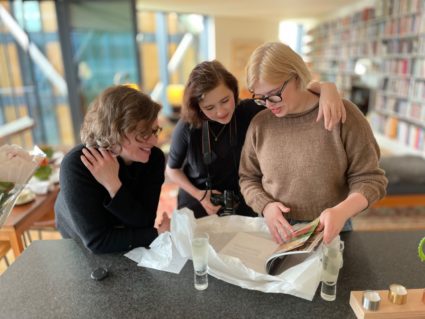the wonderful world of Arvon

 But first, I’ve got to stop laughing and report that it’s happening again: the bizarre and wonderful world of customer service in my adopted land. I just now rang up the Olympia Horse Show ticket office to book for the Christmas Show, having tried to buy tickets online and being told they were sold out for the Friday. Not feeling defeatist I thought, “Hang on, I bet a real person can help me here,” and it was the work of a moment to get an agent on the line. And then the fun began:
But first, I’ve got to stop laughing and report that it’s happening again: the bizarre and wonderful world of customer service in my adopted land. I just now rang up the Olympia Horse Show ticket office to book for the Christmas Show, having tried to buy tickets online and being told they were sold out for the Friday. Not feeling defeatist I thought, “Hang on, I bet a real person can help me here,” and it was the work of a moment to get an agent on the line. And then the fun began:
“May I help you?” (rather lackadaisical male voice)
“Yes, I’d like to buy three tickets for the Friday evening, and I’m being told online that it’s sold out, so I thought I’d check with a real person. Can you help?”
“Yeah, sure. I’ll check for you… What’s the name on your order?”
“But I don’t have an order, that’s why I’m ringing you.”
“Right. I’ll check to see if there are any available. Did you know what event you wanted?”
“YES! The Olympia Horse Show! Three tickets on the Friday night.”
“Yeah, there’s the first tier at 51 pounds, the second at 44…” (and so on)
“I’ll take the 51, please.”
“What day did you want that for?” (didn’t I say already?)
“The Friday, please.”
“And did you know how many tickets you wanted?” (hmmm…)
“Yes, please, three tickets.”
“That’s sold out, actually, if you wanted the Friday.”
“Yes, I did. Are there tickets at any other price?”
“Did you know how many you wanted?”
Grrr! At this point I felt I had been thrust all unknowing onto the stage of an amateur production of an Ionesco play.
The long and short of it is, Friday’s sold out full stop. I finally got tickets for Thursday, but I’m not at all sure they will turn out to be for the horse show. If I end up booked for the “Christmas Conference for the Lactose Intolerant and Vegan in the London Expat Community,” I will be not at all surprised.
Right, rant over. The point of my post today is simply to wax lyrical over last week’s experience at the Arvon Foundation at Totleigh Barton. To think that eight days ago I could not really have lisped the tender syllables of the place because I was completely underwhelmed at the thought of going… and completely overwhelmed at the thought of leaving home. The whole thing just goes to show that getting right away, and having the courage to leave all the whole of your life details in the hands of other carefully chosen people, is a fantastic idea. Go, do.
Once I actually left home, it turned out, I was fine. Just the physical act of shutting the door behind me was therapeutic, really. I felt the weight of the world drop from my shoulders! Isn’t that pathetic. I really must get out more. A lovely trip through the misty countryside to arrive at Exeter St David’s train station and much covert scrutiny of my fellow arrivees to try to determine who might be a food writer. And wondering where the promised taxi might possibly be, and generally feeling extremely footloose and random, not at all my usual sense of being firmly planted in a situation where all the pieces are in place for normal life.
I caught the eye of a girl who struck me as having a suitcase full of recipes, so I approached and said, “Food writing?” and she laughed and said, “Yes, I’m Louise.” The first friend, very promising. A completely jolly man with a perfectly English shock of blond hair approached and said, like a line in a play, “Food writing?” We laughed. He was Charlie, and quite firmly the second friend. More and more people gathered round, a very young chap called Adam and a reserved, quietly observant man called Edward, an unassumingly friendly lady called Pauline… and there was the first taxi, so there was a rather gentlemanly skirmish to allot the first passengers since clearly we would need more than one conveyance.
Charlie, Edward and I were left peacefully behind to await the next taxi, and there was perhaps 25 seconds of hesitance before we began the relentless banter that became what Avery has described as (having heard thousands of stories by now) “The Kristen, Edward and Charlie Show.” We could not talk fast enough. Edward’s chuck-it-all, I’m-bloody-addicted-to-cooking three-month stint at Ballymaloe, a cookery school in County Cork, Ireland, Charlie’s devotion as a PR man to the fate of a Scottish regiment. I don’t remember if I contributed anything more intriguing to the general mayhem than confessing a hatred of tofu, but in any case we made fast friends in an instant, and then realized that no taxi was in sight to take us to our destination. Charlie rang up the company. “It’s broken down you say, and you’re sending another? In 45 minutes? And you think we should have a cup of tea and wait? Right…” He strode over to the taxi rank nearby and gestured thumbs-up to us, and we were off.
There followed an hour-ish of the most entertaining conversation I can ever remember. What did we talk about? Anything and everything, our words spilling over each other in reckless silliness. I think a lot of our instant bond came from sheer relief: the unspoken fear we had all harbored about our upcoming week, a jump into the unknown, an inescapable throwing together of strangers for an experience grounded in total isolation. What if there was no one of interest, I think we had all feared, what if everyone is a dire bore and one can’t get away? What if I’ve landed myself into a week of stilted conversations about nothing, punctuated by miserable, enforced togetherness at mealtimes? This had, I think, been in all our minds, and our joy at finding fascinating (well, I can speak only for my perception of Edward and Charlie), well-spoken people with intriguing stories to tell made us rather instantly the best of friends. “How bad can it be,” Charlie mused, “if we at least have each other to talk to?” Little did we know, the only problem over the coming week was going to be getting enough of the people around us. There was never a lack of conversation, all week.
Our taxi driver, sitting beside me, emerged from his silence to say, “We are about fifteen minutes away,” and I said, “What’s your name, anyway?” “I am Sedgkin, I am Turkish,” he said, “and I must ask you: are you all comedians? Because this is the best taxi ride I have ever had.”
At one point, twisting around in my seat as I had to, to chat, I heard Charlie say what I thought was, “Then I spent two years as Santa,” which struck me as amazing. “Do you know David Sedaris?” I asked, instantly thinking of his mind-bendingly hilarious stories of his days as a Macy’s Christmas elf in New York. “You’ve got to listen to it, with your experiences!” I went on, although taking in a bit the utter blankness on their faces. Typical British people, I thought, thinking Americans rave on about the stupidest things, I thought, feeling a surprising hurt that my two new best friends didn’t understand my enthusiasm. Then it dawned on me. “WHAT did you say you spent two years doing?” And of course that was it. He spent two years at SANDHURST, say that with a British accent. For God’s sake. If I could have crawled under the seat I would have. “You know, the place Prince William went,” Charlie added helpfully, “passing out and so on.” Passing out: if I could have done that, I would have.
We arrived in gravel-spitting splendor and got out of the car, to be confronted with the most dramatic of landscapes and architecture, as you see. Twilight was coming on, there were several smokers in the group casually lighting up outside what would turn out to be the kitchen window, a chap roared up on a motorcycle dressed in leather and I thought, “This could be very interesting.” A completely unfamiliar wave of glee came over me as it dawned on me that I was absolutely on my own, about to make what friends I would of these unknown people. I felt a part of me that had been sleeping wake up suddenly: that person that a person is when stripped of all the cozy bits that make up one’s identity: family, home, responsibilities, routine. Perhaps I’m alone in feeling so dependent on those cocooning strands of identity, I don’t know. I do think most people find it easier to let go of them than I do. But I did.
I can tell you right now that the food, from Day One to Day Five (as we all uniformly referred to the passage of time!) was nearly uniformly diabolically bad. Isn’t that ironic? Here we were, sixteen aspiring food writers gripped with varying degrees of obsession with what we eat, and… it was dire. We were faced with precisely the same menu and store of ingredients as, say, a group of poets or science fiction writers would be. Oven-baked Spanish Risotto? I don’t even know where to start in my list of objections to THAT notion. Where else do you bake something? Risotto is Italian, not Spanish, and is NEVER baked, even in an oven. For heaven’s sake. Fried Tomato and Haloumi Stacks? That’s just WRONG.
I can also tell you that you may expect an instant ratcheting-up of your tendency to swear, should you embark on an Arvon week. I never swear, honestly. Who can, with an 11-year-old as one’s constant companion? Well, I do now, or I did and now I’m having to rein in my appalling language in situations like a missed shot on the tennis court or an impossible conversation with a ticket agent on the telephone. For &^%$‘s sake.
We learned from Simon, our Arvon host, that part of the week’s activities would be cooking together, in groups of four, each night for dinner. At this, Edward, Charlie and I fell over each other racing to the sign-up sheet. “Spicy Roast Chicken With Spinach” seemed the least dire choice, although a bit laconic in its wording. Spinach how? Ah well, how bad could it be. And we’d have fun. We gathered up the only other American, a mysterious travel writer called Roger, for our foursome, the last night of the adventure. Little did we know what dramas would ensue in the kitchen, to the menu, to all our friendships, as the week progressed.
Another thing I can tell you is that spending five days having one’s every WORD scrutinized, analyzed, described alternately as “rubbish,” “riveting,” “just wrong,” “truthful but awkward,” etc., is one of the most life-changing experiences a writer can have. Can you imagine? Several of us discussed the phenomenon as the week went on. “Don’t you find yourself measuring your words to a degree you never have before?” the youngest member of our group, Sam, asked ingenuously one afternoon, as we sat keeping the smokers company in the sun outside the kitchen. “And not just in writing,” I agreed, “even speaking has become something I can’t do just naturally anymore!”
I’ll describe to you the sequence of our hours, and you can imagine how stunningly self-conscious, and intimately connected to one another it makes writers, as the days go by. First thing in the morning: a trek to the ancient barn adjacent to the house, with soaring ceilings fitted with the most hideously inefficient heaters ever devised. We all arranged ourselves on the several sort of stage-set-like draped sofas around the perimeter of the room (I kept imagining someone from an Alan Bennett play to leap out from behind one). Our tutors, Tamasin Day-Lewis and Orlando Murrin, would bark at us to get in and get started. They set us an exercise to write about that instant, twenty minutes’ time limit. Holding up a lemon, Orlando said on our first real day of work, “Describe this object to an alien. Twenty minutes.” Oh, no. But oh, yes. And twenty minutes later, we each read out our pieces to the whole group, at that point relative strangers, to the tutors’ (and eventually all our) rigorously truthful response. Painful! Scary!
Then lunch together, making tentative forays on that first day into friendship (although “The Kristen, Edward and Charlie Show” was full-on even on Day Two of our adventure, so at least there was always some banter, even initially. Personalities began to emerge: motherly and yet feisty Rosie, Roger the Spy (was he or wasn’t he? He could tell us but then he’d have to kill us), peaceful Katie, ambitious and very young Adam, laconic but intense Jack the motorcycle-riding professional chef… how would I be described? An interesting question!
After lunch we had our individual tutorials with Tamasin and Orlando, and dear readers, I don’t know if I was really practical, really brave, or really stupid to schedule mine both on the first day. Probably a bit of all three, really. My idea had been that I would get their responses and their criticism to the pieces I had submitted right at the start, and then have the whole week to work on them. Well, perhaps. But what I didn’t bargain on was the gut-wrenching shock of professional, no-holds-barred feedback (how I hate that word now) before I had properly learned what my strengths and weaknesses were. True, I had all week to work on what they said, but I also to my peril had all week to REMEMBER what they said, in all its black-and-white drama. Fairly shattering, I have to confess…
Then dinner (enough said), then more reading-aloud in the big barn at night. Thankfully, the atmosphere at night was quite definitively admiring, enjoying, supporting, as an antidote to the fiercely honest mood of the daytime readings. I don’t think any of us would have survived otherwise, quite simply. You emerge from a week of this treatment completely without fear of anything anyone will ever say again about your writing, I assure you. But it’s a week of trial by most eloquent fire.
Well, I must get back to actual living, as opposed to describing living. What a bore that is, sometimes, the regular living. Because yes, I’m back in the reality of supervising Latin homework, emptying the dishwasher, remembering people’s birthdays, filling out school forms. But I’ll be back, because I really need to put some of this extraordinary experience into words, if only for me…


1 Response
[…] cannot extol the brilliance of the Arvon way of life. Several years ago I spent a week in the wilds of Devon on a course designed to teach us “food writing.” Mornings of […]